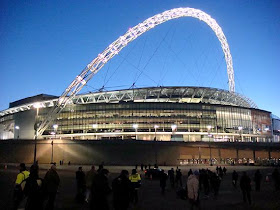PARTISAN ALERT: This article is quite partisan.
Unfortunately Scotland aren't going to the World Cup this year. Despite qualifying for six of the seven tournaments from 1974 to 1998, a tartan presence has been noticeably absent ever since. Doing what we have come to do best - that is, ignominious defeat against average European sides away from Hampden - has left the Tartan Army dining out on the meagre crumbs of comfort that we dredge up every four years: Archie Gemmill's goal in '78 and the fact that we were unofficially the best team in the world for a few glorious months in 1967. We laugh (eventually), because if we didn't, we'd probably end up invading Norway.
Our last major tournament was France ’98. Imagine how it felt to find out that we were opening against Brazil (a combination of elation, disbelief and the usual ironic despondency, if you’re interested). Imagine the jaws that dropped as John Collins equalised from the spot, then the colour of the air (fairly blue) when Tommy Boyd scored FOR them with his knackers. Imagine the reverberating echo of a million tins of Irn Bru being flung at some 100,000 cats. Then of course, we came home too soon, having been implored by Del Amitri (DEL AMITRI) not to, after a 3-0 embarrassment at the hands of African footballing powerhouse Morocco.
A close brush with European Championship qualification in 2008 quenched the thirst for big results and actually had us believing that come the World Cup qualifiers for 2010, we would have a decent crack at getting into at least a playoff. That was reinforced by the fact that we found ourselves in the continent’s smallest group, with the likelihood that FIFA’s mystifying rule on stripping other teams’ results against their group’s respective whipping boys would play into our favour. How reassuring then, as I alluded to above, that we could go and taste defeat in Macedonia and Norway, before failing to score (from two yards, in one case) against the latter at home and upsetting the country’s most clinical finisher to the point of retirement in the process.
Had it not come with the caveat of unexpected success in the Euro qualifiers, this would have been treated as a fairly routine failure. But Alex McLeish, having assuaged the nerves when Walter Smith left the manager’s job, had brought further progress in 2007/08 and we expected that to continue when he handed the reins to George Burley. Give the Tartan Army an inch of hope and the passion for the team means that it will take miles (no, I will not say how many). We still came quite close – down to the final game against the Dutch – but it wasn’t enough. The momentum gained under Smith and McLeish ground to a halt under Burley, who was mysteriously kept on for one game after the qualifiers, in which the Welsh thumped us 3-0 in a meaningless friendly. The nadir had been reached.
What’s happening at the SFA now is a similar period of introspection to that of England’s following their failure to qualify for the Euros in 2006. Craig Levein is in charge. Gordon Smith has (unfortunately) resigned. Most importantly of all, however, we beat the Czech Republic in a rehearsal qualifier for our Euro 2012 group. After the game, the mood in Scotland was odd. It didn’t really matter about the performance, because we won. But then, it didn’t really matter that we won, because it was a friendly. Pragmatism and perspective from the Tartan Army? Possibly.
Still, the 2010 World Cup is round the corner and we’ve had plenty of time to lick our wounds and critique our own. Now it’s time to relentlessly slate the English.
That’s a joke, of course. As a Scot in London, you have to expect plenty of Anglophilia. While I’ve got nothing against the team or the people, the country will be unbearable throughout the tournament. I’m sorry, but it’s true. Saturation coverage pervades every major tournament England are involved in and it always has. Personally, as an alternative I’m looking forward to the Group of Death. And the ‘new’ Brazil. The classy Spanish. The battle between exceptional Argentinean footballers and their manager.The Mexico squad with only five midfielders. The France squad with no strikers. I am of course extremely interested in how England get on, given their flimsy squad, but I also want to see the US do well in case anyone missed their Confederations Cup exploits last year.
Yes, I’m gutted Scotland aren’t there. It means that I won’t get to scream and drink myself stupid for three matches and then feel crap that we’re out. But the World Cup is the World Cup. It’s going to be incredible and besides, the qualifiers were ages ago (but I still remember, Chris Iwelumo). What’s not to look forward to? Rob MacDonald












